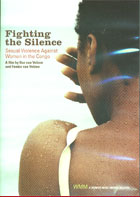
Fighting the Silence: Sexual Violence Against Women in the Congo 2007
Distributed by Women Make Movies, 462 Broadway, New York, NY 10013; 212-925-0606
Produced by Ilse van Velzen and Femke van Velzen
Directed by Ilse van Velzen and Femke van Velzen
DVD, color, 53 min.
Sr. High – General Adult
African Studies, Congo, Gender Studies, Sexual Violence, War, Women’s Studies
Date Entered: 11/30/2011
Reviewed by Sue F. Phelps, Washington State University, Vancouver, WA“War came to destroy us… take our honor… and disgrace us.” “Rape started with the war.” “This problem can only end if we can talk about it.” “Silence will only make it worse.”
Fighting the Silence documents the efforts of women who are committed to restoring the lives of women and families who were victims of rape and sexual violence perpetrated by soldiers during the five year war in the Democratic Republic of the Congo. Using the medium of drama, lecture, music and discussion the women confront the attitudes of silence, blame and community tolerance that allow rape to continue in the aftermath of the war.
Twin sisters Ilse and Femke van Velzen are independent filmmakers whose goal is to expose cultural injustices. Through interviews with women who were raped, husbands of the victims and community members they record the emotional, physical, and societal consequences of rape in the Congo. In a society where women are already second class citizens victims of sexual assualt do not want to tell anyone they were raped and beaten because they feel shamed by their communities. Husbands are pressured to send their raped wives back to her parents’ home because they are seen as having “shared their wife” with the enemy. Children do not understand but still suffer the consequences of a traumatized family. This film documents the work of one outspoken woman, Chantal, an activist who is not only leading the charge against silence on the part of women but is also in confronting the men who persist in making excuses for rapists. Though the film stresses the damage to individuals, families and the community through the use of rape as a weapon of war it ends with stories of healing and understanding for the women who are willing to talk about the trauma and the men who are willing to understand and persevere in their marriage.
The film is subtitled and the cinematography is creative, realistic and at times, strikingly beautiful. It would be appropriate for high school and academic libraries to support contemporary African studies and women’s studies programs. It might also be useful as an example of community support and therapeutic relationships for community activists. Public libraries would find this film a positive addition to their non-fiction film collection.
Awards
- Millenium Film Festival, Jury Award
- Al Jazeera International Film Festival, Jury Award
- Sucre Human Rights Film Festival Bolivia, Jury Award
- Docupolis Spain, Best Documentary
- Watchdoc Human Rights Film Festival Poland, Best Documentary